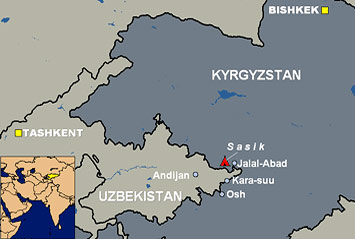Kyrgyzstan: Resettlement countries meeting in Geneva on Uzbek asylum seekers
Kyrgyzstan: Resettlement countries meeting in Geneva on Uzbek asylum seekers
We are holding an urgent meeting today in Geneva in an attempt to find some emergency resettlement destinations for some 450 Uzbek asylum seekers in Kyrgyzstan. The meeting was called after Assistant High Commissioner Kamel Morjane, returning from a visit to Kyrgyzstan earlier this week, said that emergency resettlement was needed to protect the group.
Traditional resettlement countries, including Sweden, Denmark, Norway, Finland, the Netherlands, Ireland, the United States, Canada, Australia and New Zealand, have been invited to this morning's meeting. Resettlement of the asylum seekers could be organised in a matter of days once agreement has been reached with governments.
The Assistant High Commissioner said emergency resettlement was needed because it is not possible to guarantee the security of the asylum seekers in Kyrgyzstan, which is coming under pressure from its much larger neighbour, Uzbekistan, to return the group. UNHCR is especially concerned for 29 of the asylum seekers, who are currently in detention in the Kyrgyz city of Osh, and under imminent threat of deportation. Three UNHCR lawyers, along with the Kyrgyz authorities, have been carrying out accelerated status determination for the 29. It is not clear, however, whether the Kyrgyz authorities will be willing to release the 29 for resettlement.
The remaining 426 Uzbeks are in the refugee camp of Sasyk in western Kyrgyzstan. Given the lack of an independent investigation into the 13 May events in Andijan that led to their flight, UNHCR considers that this group deserves the benefit of the doubt, and should be given international protection.
On 9 June, Kyrgyzstan expelled four of the asylum seekers who had arrived with the group. Despite all its efforts, UNHCR has not had access to the four since they arrived back in Uzbekistan.
Mr. Morjane pledged UNHCR and international support for the Kyrgyz, who have received the Uzbek refugees during a particularly sensitive transitional period following a change of regime, and shortly before their general elections. As his mission and today's urgent meeting with resettlement countries illustrates, UNHCR is making every effort to find a rapid solution to this situation while ensuring international protection standards are met. Thus, there should be no forcible return, or refoulement, which is prohibited under both the 1951 Refugee Convention and the Convention Against Torture. Kyrgyzstan is a signatory to both instruments.





